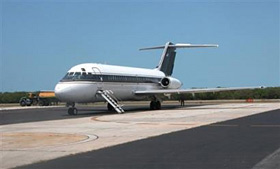 |
 |
 |
 Health & Beauty | April 2006 Health & Beauty | April 2006  
Alarm Over Rise in Venezuelan Drug Traffic
 Andy Webb-Vidal - FT.com Andy Webb-Vidal - FT.com


| | The commerical jet from Caracas, Venezuela where Mexican soldiers seized 5 tons of cocaine worth more than $100 million is parked on the tarmac of the airport of Ciudad del Carmen, 880 kilometers (550 miles) east of Mexico City Tuesday, April 11, 2006. (AP/Por Esto!) |
Venezuela is becoming the leading transit country through which the bulk of the world’s cocaine is smuggled to the US and Europe, according to foreign law enforcement officers.

Venezuela’s growing role in the illegal drugs trade was underscored by the seizure in Mexico last week of 5.2 tonnes of cocaine aboard an aircraft that arrived from Caracas international airport.

Ten people were arrested, including a Venezuelan co-pilot, after Mexican troops discovered the drugs hidden in 128 suitcases aboard a DC-9 aircraft at Ciudad del Carmen airport, in eastern Mexico. Drugs are regularly seized in Mexico, but experts say last week’s haul, one of the country’s largest, offers a glimpse into what European and US counter-narcotics agents are labelling the “Venezuela connection”.

Venezuelan president Hugo Chávez and other officials in his left-leaning “Bolivarian Revolution” movement insist the country is dedicated to fighting drugs. They also claim the authorities are succeeding. Venezuela seized 58.4 tonnes of cocaine last year, 87 per cent more than in 2004, according to the National Anti-Drugs Office. “No government has dealt such a serious blow to drug trafficking as that of the Bolivarian Revolution,” Mr Chávez said last week.

However, European and US anti-drugs officers take a markedly different view. Greater seizures by Venezuela, they say, indicate rising amounts of cocaine being funnelled through the country – probably more than half of Colombia’s annual output of about 400 tonnes of cocaine.

“The Mexican seizure is symbolic of the growing significance of the Venezuela connection,” said a European drugs enforcement officer.
Last September, the US “decertified” Venezuela’s anti-drugs efforts and placed it on Washington’s narcotics blacklist after President George W. Bush said the country had “failed demonstrably” to combat the trade. The drugs issue was added to the list of factors that have soured relations between the US and Venezuela. Shortly before the decertification, Mr Chávez accused the US Drug Enforcement Administration of spying on his government.

Colombian and US officials have long alleged that Venezuela provides an undeclared safe haven for the Revolutionary Armed Forces of Colombia, or Farc, the country’s main leftwing rebel group. Mr Chávez denies this. However, US and Colombian officials say the Venezuela haven has been converted by the Farc into a strategically important meeting point for trading drugs for money and arms.

US authorities allege that Farc, classified as a terrorist organisation by the US and Europe, has replaced Colombia’s once dominant cartels and now supplies more than half of the world’s cocaine.

The US Justice Department last month indicted the top 50 commanders of the 15,000-strong Farc on charges of importing more than $25bn worth of cocaine into the US and other countries. Farc guerrillas have been attempting to overthrow the Colombian state for four decades, but in recent years they have turned to protecting cocaine labs and plantations of coca, the plant from which the drug is produced.

Colombian authorities led by President Alvaro Uribe, who is strongly backed by Washington, have pushed Latin America’s oldest insurgency into the country’s more remote southern and eastern jungles. Consequently, the Farc is pushing its cocaine through Venezuela, sometimes with help from corrupt officers from the National Guard, the institution responsible for border and airport security.

Mexican authorities said last week they were investigating whether Farc was the original supplier of the seized cocaine. The DC-9 that departed Caracas on April 11 arrived six days earlier from St Petersburg Clearwater airport, in Florida, and was deregistered by the US Federal Aviation Administration on April 13. A US anti-drugs official said traffickers typically purchase an aircraft in the US and bring it to Venezuela for refitting and loading with drugs.

The US State Department’s 2006 International Narcotics Control Strategy Report, released last month, said of Venezuela: “Two key factors have contributed to an increase in trafficking during 2005: rampant corruption at the highest levels of law enforcement and a weak judicial system.”

Last year the US revoked the visas of several National Guard officers for alleged complicity in drugs trafficking through Venezuela.

But the country is being increasingly used as a transit location by traditional Colombian traffickers and associated paramilitary groups, as well as the Farc, for another reason. Under Mr Uribe, Colombia has extradited dozens of traffickers to the US. Venezuelan law prohibits extradition of suspects likely to face jail sentences of over 30 years, the usual punishment given in the US to significant convicted drugs traffickers. | 
 | |
 |



